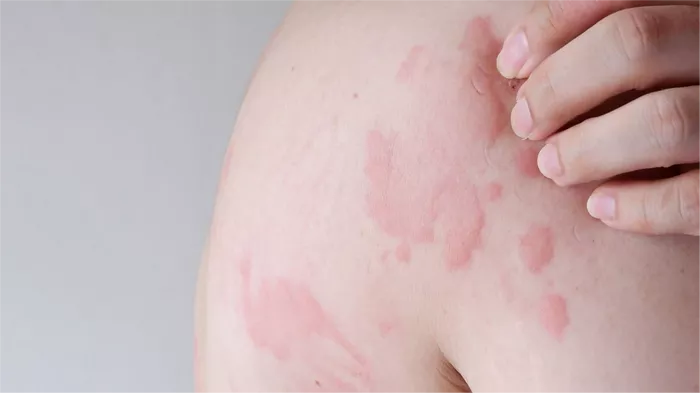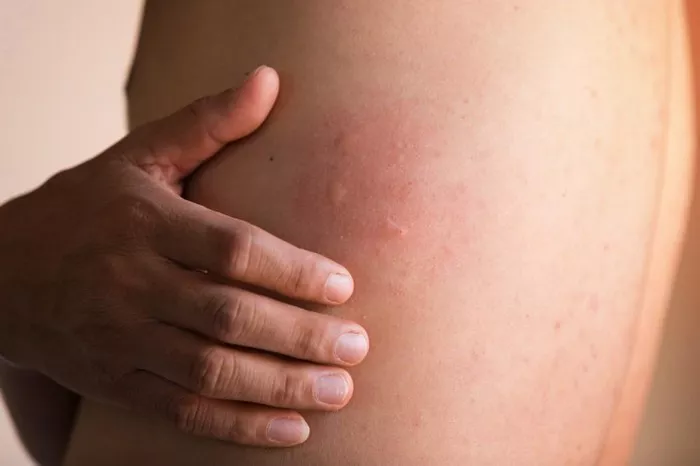Hives, also known as urticaria, are a common condition characterized by the sudden appearance of red, itchy welts on the skin. While often associated with allergic reactions in children, hives can affect adults as well, sometimes with more persistent and complex symptoms. This article delves into the intricacies of hives in adults, exploring their causes, symptoms, diagnosis, and treatment options.
Causes of Hives in Adults
Hives occur when the body releases histamine and other chemicals into the bloodstream. This response can be triggered by various factors:
Allergens
Common allergens include foods (such as nuts, shellfish, and eggs), medications (like antibiotics and nonsteroidal anti-inflammatory drugs), insect stings, and pollen. When the immune system identifies these substances as harmful, it releases histamines that lead to hives.
Physical Triggers
Physical stimuli such as pressure, temperature changes, sunlight, water, and exercise can cause a type of hives known as physical urticaria. For instance, dermographism (skin writing) occurs when a person develops welts from scratching or firmly stroking the skin.
Chronic Conditions
Chronic urticaria, where hives last for more than six weeks, can sometimes be linked to underlying health issues. Autoimmune diseases like lupus, thyroid disease, or celiac disease are known to contribute to chronic hives in adults. Additionally, chronic infections, including hepatitis or bacterial infections, may also play a role.
Stress and Anxiety
Emotional stress and anxiety are recognized as potential triggers for hives. The body’s reaction to stress can lead to the release of histamines, causing hives or worsening existing symptoms.
Idiopathic Causes
In many cases, the exact cause of hives cannot be determined, a condition referred to as idiopathic urticaria. Despite extensive testing, some individuals never identify a specific trigger for their hives.
Symptoms of Hives
The hallmark symptom of hives is the appearance of red, raised, and itchy welts on the skin. These welts can vary in size from small spots to large patches and may merge to form larger areas of swelling. Hives can appear anywhere on the body, including the face, lips, tongue, throat, or ears. Key symptoms include:
Itching and Discomfort
Itching is often intense and can cause significant discomfort, disrupting daily activities and sleep.
Swelling
Swelling (angioedema) may occur around the eyes, lips, hands, feet, and genitals. In severe cases, swelling can affect the throat, leading to difficulty breathing.
Rapid Onset and Resolution
Hives typically appear suddenly and can last from a few minutes to several hours. They may fade away only to reappear in different areas.
Variability in Appearance
The appearance of hives can change rapidly, with new welts appearing as others fade. This dynamic nature can make the condition particularly frustrating for those affected.
Diagnosing Hives in Adults
Diagnosing hives involves a combination of patient history, physical examination, and sometimes laboratory tests. The goal is to identify potential triggers and rule out underlying conditions.
Medical History and Physical Examination
A detailed medical history is essential to understand potential triggers and patterns. Questions may include:
- When did the hives first appear?
- How long do the welts last?
- Are there any identifiable triggers (foods, medications, physical stimuli)?
- Are there any associated symptoms, such as fever or joint pain?
During the physical examination, the healthcare provider will look for typical signs of hives and assess any areas of swelling.
Allergy Testing
Allergy testing, including skin prick tests or blood tests, may be conducted to identify specific allergens. These tests can help pinpoint potential triggers, especially if a food or medication allergy is suspected.
Blood Tests and Imaging
In cases of chronic urticaria, blood tests may be performed to check for underlying conditions such as thyroid disease, autoimmune disorders, or infections. Imaging studies are rarely needed but may be considered if there is suspicion of an underlying systemic condition.
Challenge Tests
Challenge tests involve exposing the patient to suspected triggers under controlled conditions to observe the reaction. These tests can be useful in diagnosing physical urticaria or confirming specific food allergies.
Treatment Options for Hives
The treatment of hives in adults focuses on relieving symptoms, identifying and avoiding triggers, and addressing any underlying conditions. Treatment options include:
SEE ALSO: What Is Postpartum Hives
Antihistamines
Antihistamines are the first line of treatment for hives. These medications block the effects of histamine, reducing itching and swelling. Non-sedating antihistamines, such as cetirizine, loratadine, and fexofenadine, are commonly used. In some cases, sedating antihistamines like diphenhydramine may be prescribed for nighttime relief.
Corticosteroids
For severe or persistent hives, short courses of oral corticosteroids (such as prednisone) may be prescribed. These medications reduce inflammation and provide quick relief. However, long-term use is avoided due to potential side effects.
Other Medications
In cases where antihistamines and corticosteroids are not effective, other medications may be considered, including:
- Leukotriene Receptor Antagonists: These drugs, such as montelukast, can help reduce symptoms by blocking the action of leukotrienes, chemicals involved in allergic reactions.
- Omalizumab: This monoclonal antibody is used for chronic idiopathic urticaria that is unresponsive to conventional treatments. It works by targeting immunoglobulin E (IgE), a key player in allergic reactions.
- Immunosuppressants: In rare, severe cases, immunosuppressants like cyclosporine may be used under careful medical supervision.
Avoiding Triggers
Identifying and avoiding triggers is crucial in managing hives. This may involve dietary changes, avoiding certain medications, or minimizing exposure to known allergens. For physical urticaria, protective measures like wearing loose clothing and avoiding sudden temperature changes can help.
Lifestyle Modifications
Stress management techniques, such as mindfulness, meditation, and regular exercise, can help reduce the frequency and severity of hives. Keeping a symptom diary may also be beneficial in identifying potential triggers and tracking the effectiveness of treatments.
Home Remedies
Several home remedies can provide additional relief from hives:
- Cold Compresses: Applying a cold compress to the affected area can help reduce itching and swelling.
- Oatmeal Baths: Adding colloidal oatmeal to a lukewarm bath can soothe irritated skin.
- Calamine Lotion: Calamine lotion can provide a cooling effect and alleviate itching.
Complications of Hives
While hives are generally not life-threatening, they can lead to complications in some cases:
Anaphylaxis
In rare instances, hives can be part of a severe allergic reaction called anaphylaxis. This condition requires immediate medical attention and is characterized by difficulty breathing, swelling of the throat and tongue, rapid heartbeat, and a drop in blood pressure.
Chronic Urticaria
Chronic urticaria can significantly impact quality of life, leading to persistent discomfort, sleep disturbances, and emotional distress. Managing chronic hives often requires a multifaceted approach and ongoing medical supervision.
Secondary Infections
Scratching hives can break the skin, increasing the risk of secondary bacterial infections. It is essential to keep the affected areas clean and avoid scratching as much as possible.
Living with Hives
Living with hives can be challenging, but several strategies can help manage the condition and improve quality of life:
Education and Support
Educating oneself about hives, potential triggers, and treatment options is crucial. Support groups, both online and in-person, can provide emotional support and practical advice from others experiencing similar challenges.
Regular Follow-Up
Regular follow-up with a healthcare provider is essential for monitoring the condition, adjusting treatments, and addressing any new symptoms or concerns. Keeping an open line of communication with the healthcare team can help ensure optimal management of hives.
Personal Care Plan
Developing a personalized care plan, including medication management, trigger avoidance, and lifestyle modifications, can empower individuals to take control of their condition. Working closely with healthcare providers to tailor this plan to specific needs and preferences is important.
Mental Health Support
The chronic nature of hives can take a toll on mental health. Seeking support from mental health professionals, such as counselors or therapists, can help individuals cope with the emotional aspects of living with hives. Techniques such as cognitive-behavioral therapy (CBT) can be particularly effective in managing anxiety and stress related to the condition.
Conclusion
Hives in adults are a multifaceted condition with various triggers, symptoms, and treatment options. Understanding the potential causes and seeking appropriate medical care are essential steps in managing this condition. While hives can be uncomfortable and disruptive, effective treatments and lifestyle modifications can significantly improve quality of life. By working closely with healthcare providers and adopting a proactive approach, individuals with hives can find relief and maintain a sense of control over their condition.
Related Topics:


























